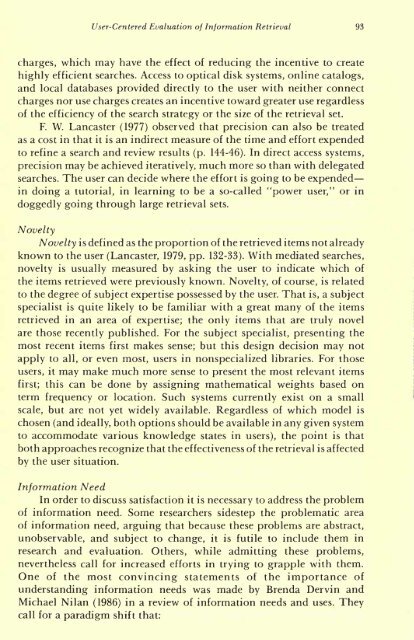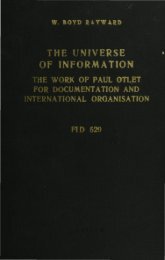User-Centered Evaluation of Information Retrieval - ideals
User-Centered Evaluation of Information Retrieval - ideals
User-Centered Evaluation of Information Retrieval - ideals
Create successful ePaper yourself
Turn your PDF publications into a flip-book with our unique Google optimized e-Paper software.
<strong>User</strong>-<strong>Centered</strong> <strong>Evaluation</strong> <strong>of</strong> <strong>Information</strong> <strong>Retrieval</strong> 93<br />
charges, which may have the effect <strong>of</strong> reducing the incentive to create<br />
highly efficient searches. Access to optical disk systems, online catalogs,<br />
and local databases provided directly to the user with neither connect<br />
charges nor use charges creates an incentive toward greater use regardless<br />
<strong>of</strong> the efficiency <strong>of</strong> the search strategy or the size <strong>of</strong> the retrieval set.<br />
F. W. Lancaster (1977) observed that precision can also be treated<br />
as a cost in that it is an indirect measure <strong>of</strong> the time and effort expended<br />
to refine a search and review results (p.<br />
144-46). In direct access systems,<br />
precision may be achieved iteratively, much more so than with delegated<br />
searches. The user can decide where the effort is going to be expended<br />
in doing a tutorial, in learning to be a so-called "power user," or in<br />
doggedly going through large retrieval sets.<br />
Novelty<br />
Novelty is defined as the proportion <strong>of</strong> the retrieved items not already<br />
known to the user (Lancaster, 1979, pp. 132-33). With mediated searches,<br />
novelty is usually measured by asking the user to indicate which <strong>of</strong><br />
the items retrieved were previously known. Novelty, <strong>of</strong> course, is related<br />
to the degree <strong>of</strong> subject expertise possessed by the user. That is, a subject<br />
specialist is quite likely to be familiar with a great many <strong>of</strong> the items<br />
retrieved in an area <strong>of</strong> expertise; the only items that are truly novel<br />
are those recently published. For the subject specialist, presenting the<br />
most recent items first makes sense; but this design decision may not<br />
apply to all, or even most, users in nonspecialized libraries. For those<br />
users, it may make much more sense to present the most relevant items<br />
first; this can be done by assigning mathematical weights based on<br />
term frequency or location. Such systems currently exist on a small<br />
scale, but are not yet widely available. Regardless <strong>of</strong> which model is<br />
chosen (and ideally, both options should be available in any given system<br />
to accommodate various knowledge states in users), the point<br />
is that<br />
both approaches recognize that the effectiveness <strong>of</strong> the retrieval is affected<br />
by the user situation.<br />
<strong>Information</strong> Need<br />
In order to discuss satisfaction it is necessary to address the problem<br />
<strong>of</strong> information need. Some researchers sidestep the problematic area<br />
<strong>of</strong> information need, arguing that because these problems are abstract,<br />
unobservable, and subject to change,<br />
it is futile to include them in<br />
research and evaluation. Others, while admitting these problems,<br />
nevertheless call for increased efforts in trying to grapple with them.<br />
One <strong>of</strong> the most convincing statements <strong>of</strong> the importance <strong>of</strong><br />
understanding information needs was made by Brenda Dervin and<br />
Michael Nilan (1986) in a review <strong>of</strong> information needs and uses. They<br />
call for a paradigm<br />
shift that:
















